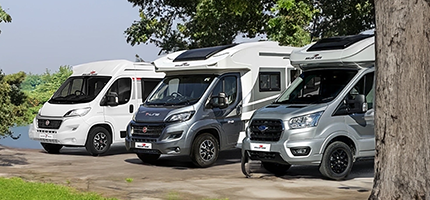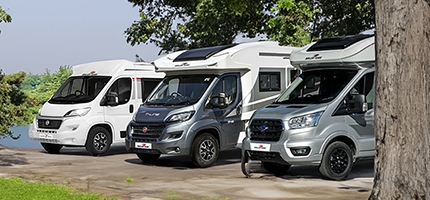
Lets find your perfect Motorhome
Caravan or Motorhome?
That good old question. What is best?
I thought before we dive into complexities of Motorhome - Campervans I would give you my overview of this old question.

Make certain the layout fits
Believe me, you'd be surprised at how many people purchase their first motorhome only to trade it in within six months because they realize the layout or size doesn't suit their needs. I want to help you avoid making the same mistake.
Here are some tips which is always a good starting point
Hiring a motorhome or campervan before making a significant purchase is indeed a wise and practical approach. Here are some advantages to renting before committing to buying:
Test the Waters:
Renting allows you to test the motorhome or campervan lifestyle to see if it suits your needs and preferences. It's a great way to determine if you enjoy the experience of traveling in a mobile home and if it aligns with your travel style.
Cost Savings:
Purchasing a motorhome or campervan is a substantial investment. Renting first helps you avoid the financial commitment and potential depreciation that comes with ownership. It's a cost-effective way to assess whether this lifestyle is right for you.
Variety:
Renting gives you the opportunity to try different types and models of motorhomes or campervans. This helps you understand what features and layouts work best for your needs, allowing you to make an informed decision when you decide to buy.
Learning Experience:
Your maiden voyage in a rented motorhome or campervan is a valuable learning experience. You can discover what you like and dislike, pick up essential RVing skills, and figure out what accessories or modifications you might want in your own vehicle.
Overall, renting a motorhome or campervan before making a significant purchase is a prudent step that can save you both money and potential regrets while allowing you to explore the world of motorhoming with greater confidence.
When looking for a motorhome, your preferences may vary based on your needs and lifestyle. Here's a list of features and qualities that people commonly desire in a motorhome:
Size:
Determine the right size of the motorhome, considering the number of travelers and how much space you need for comfort.
Layout:
Choose a layout that suits your preferences, whether it's a rear bedroom, side kitchen, or other configurations.
Sleeping Capacity:
Ensure there are enough sleeping berths for everyone traveling with you, whether it's a bed, pull-out sofa, or bunk beds.
Bathroom:
A functional bathroom with a toilet, shower, and sink is essential for convenience.
Kitchen:
Look for a well-equipped kitchen with a stove, oven, refrigerator, and ample storage space.
Storage:
Adequate storage for clothes, kitchen supplies, and outdoor equipment is important for long trips.
Comfort:
Comfortable seating and sleeping arrangements, as well as climate control (heating and cooling), are crucial.
Entertainment:
Consider entertainment options such as a TV, stereo system, and Wi-Fi connectivity.
Safety Features:
Ensure the motorhome has safety features like seatbelts, airbags, and a reliable braking system.
Motorhome Systems:
Check for functioning motorhome systems, including electrical, plumbing, and sewage systems.
Water and Waste Tanks:
Sufficient freshwater and wastewater tank capacities for your needs.
Power Source:
Decide if you want a motorhome with a generator, solar panels, or both for power independence.
Awnings and Outdoor Space:
Awnings or outdoor living spaces can enhance your camping experience.
Fuel Efficiency:
Consider the fuel efficiency of the motorhome's engine for cost-effective travel.
Driving Comfort:
Assess the driver's area for comfort and visibility, especially on long drives.
Towing Capacity:
If you plan to tow a car or trailer, make sure the motorhome has the necessary towing capacity.
Four-Season Capability:
For year-round travel, look for insulation and climate control that can handle various weather conditions.
Leveling Systems: Motorhomes with automatic leveling systems can save you time and effort when setting up at campsites.
Maintenance Records:
If buying a used motorhome, review maintenance records to ensure it's been well cared for.
Warranty:
Consider the availability of a warranty if you're buying new or certified pre-owned.
Price and Budget:
Set a clear budget and stick to it, considering not just the purchase price but also ongoing costs like insurance and maintenance.
Resale Value:
Think about the potential resale value of the motorhome when you decide to upgrade or change your motorhome.
Brand Reputation:
Research the reputation of the manufacturer and read reviews to ensure a reliable and quality product.
Dealer Support:
Consider the proximity of authorized service centers and dealer support for your chosen brand.
Customization Options:
Determine whether you want the option to customize the motorhome to your specific needs.
Remember that finding the perfect motorhome often involves trade-offs and prioritizing what features are most important to you. Tailor your search to your personal preferences and requirements to find the motorhome that best suits your lifestyle and travel plans.
When in search of a motorhome or campervan, you often encounter the need to make trade-offs. However, creating a prioritized checklist can help you find the ideal features and amenities. Consider the following:
Microwave:
A valuable addition to any kitchen, saving time and energy.
Window Blinds:
Not only do they offer privacy, but they also regulate light and temperature effectively.
Air Conditioning:
A welcome relief during scorching summer getaways.
Carpets:
For that added touch of warmth and comfort.
Satellite Navigation:
An indispensable tool for finding destinations, especially when it can guide you along routes suitable for larger vehicles.
Gas and Electric Hob:
Some motorhomes come with both gas and electric hobs, which can conserve gas when connected to electric hook-ups at campsites.
Roof Fan:
Enhances air circulation, whether for extraction or bringing in fresh air.
TV:
Even the most intrepid traveler appreciates entertainment on rainy evenings.
Separate Toilet:
Particularly useful for extended stays in a confined space, offering more convenience.
Separate Living and Bedroom Area:
Great for early bedtimes or late-night movie watching, especially if there's a dividing curtain.
Wardrobe:
Provides a tall storage space for hanging coats and clothes.
Automatic Transmission:
Elevates the driving experience with effortless gear shifts.
Cruise Control:
A bonus when combined with automatic transmission, letting you relax and simply steer.
Smart Tech Audio:
Elevates the journey with Bluetooth audio and phone connectivity, potentially integrating useful apps for a smarter experience.
Leather Seats & Steering Wheel:
Adds a touch of sophistication and durability.
Cup Holders:
May seem trivial but proves incredibly convenient for both driver and co-pilot during lengthy drives.
These are just a few considerations from my list, but you may have additional preferences to personalize your perfect motorhome."
Ask yourself important Questions
- How often will you use it?
-
What kind of trips do you plan – weekend breaks, long holidays, or full-time touring?
-
Will you stick to campsites or go off-grid?
Maybe:
-
“We plan to use it for weekend trips and one or two long holidays per year.”
→ A mid-sized, low-profile coachbuilt model offers comfort without being too bulky. -
“We’re retiring soon and plan to tour Europe for a few months at a time.”
→ A larger A-Class or tag-axle motorhome with ample storage and comfort features may suit better. -
“We’ll use it mainly for wild camping and off-grid weekends.”
→ You’ll want a compact motorhome or campervan with good insulation, solar panels, and large water tanks.
-
How many people will regularly travel and sleep in it?
-
Will you be taking children, pets, or guests?
-
Do you need fixed beds or are you happy converting sofas each night?
Maybe:
-
“It’ll just be the two of us and our dog.”
→ A 2-berth low-profile motorhome with a fixed bed and spacious lounge could be ideal. -
“We’re a family of four with young kids.”
→ Look for an overcab motorhome with multiple sleeping areas and extra travel seats. -
“Sometimes it’s just me, other times I bring a mate or my partner.”
→ A campervan with a pop-top roof or a compact 3-berth model with flexible beds might work.
-
Do you want a full kitchen with oven and fridge?
-
Is a separate shower and toilet important?
-
Would you prefer fixed beds, or do you mind setting up the bed each night?
Maybe:
-
“I love cooking, so I want a proper kitchen with an oven.”
→ Go for a motorhome with a full kitchen layout – likely a mid-sized to large coachbuilt. -
“We’ll mostly use campsite showers, so a small washroom is fine.”
→ You can consider more compact layouts and save space for living or storage. -
“I want a fixed bed – I don’t want to faff around making beds every night.”
→ Island beds or French beds are common in motorhomes 7m and up.
-
Where will you keep the motorhome when not in use?
-
Are you comfortable driving something large?
-
Do you want to stay under the 3.5-tonne weight limit?
Maybe:
-
“I’ll store it on my driveway and prefer something under 7m long.”
→ A compact low-profile or van conversion might be a better fit. -
“We have secure storage space, and I’m used to driving vans.”
→ You have more flexibility and could consider 7.5m+ A-Class or overcab models. -
“I don’t want to go over 3.5 tonnes due to licence and toll costs.”
→ Stick to lighter models, being careful with payload if you want bikes, water, and extras.
-
Campervans – Compact, easy to drive and park, good for solo travellers or couples.
-
Low-profile coachbuilts – A popular all-rounder; more space, yet still manoeuvrable.
-
Overcab motorhomes – Ideal for families, offering extra sleeping space above the cab.
-
A-Class motorhomes – Luxurious, roomy, and built for long-term comfort.
-
Tag axle motorhomes – Heavy-duty, ultra-spacious, suited for long-term touring and large storage needs.
Maybe:
-
“We want something small enough for towns but big enough to sleep comfortably.”
→ A 6m van conversion with a fixed bed could be the answer. -
“We’re a family of five who need space and storage.”
→ Overcab or larger coachbuilt motorhomes with bunks and garage space work well. -
“Comfort is our top priority, even if it’s harder to park.”
→ Consider an A-Class motorhome with a spacious lounge and island bed.
-
Do you plan to camp off-grid or always use serviced campsites?
-
Is solar power, large water tanks, or gas storage important?
Maybe:
-
“We’ll mostly use campsites with hookups.”
→ Onboard battery and gas requirements will be minimal. -
“We love wild camping in remote areas.”
→ Look for models with solar panels, large batteries, 2+ gas bottles, and good water/waste capacities. -
“A mix of both – we want the flexibility.”
→ Choose a model with moderate off-grid capabilities and add extras like solar and inverters.
-
What’s your total purchase budget?
-
Do you want to buy new or used?
-
Have you considered insurance, servicing, and running costs?
Maybe:
-
“I’ve got £30,000 to spend.”
→ Consider a well-kept used motorhome, possibly a panel van or older coachbuilt. -
“We want a brand-new model with warranty.”
→ You’ll need £60,000–£90,000 for most new mid-sized motorhomes. -
“Running costs are a concern.”
→ Go for something under 3.5 tonnes and under 7m for lower insurance, tax, and fuel use.
-
Is it a popular and reputable brand?
-
Can you get spare parts easily?
-
Are there active online communities or support groups?
Maybe:
-
“I want a known brand so it’s easier to sell on later.”
→ Look at Roller Team, Swift, Auto-Trail, Bailey, or Hymer – well-supported and resellable. -
“I want strong community support.”
→ Popular brands tend to have Facebook groups, forums, and good dealer networks. -
“I’ll keep it long-term but want easy servicing.”
→ Fiat-based models are widespread and easy to service across Europe.
Summary:
There’s no one-size-fits-all solution when it comes to motorhomes. The key is to ask the right questions, understand your real needs, and weigh up the trade-offs. While the “perfect” motorhome might not exist, this guide can help you find a great compromise—one that suits your lifestyle and travel plans. With careful consideration, you’ll avoid making a purchase that turns out to be totally impractical and instead invest in a vehicle that brings you years of enjoyable adventures, whether it’s a peaceful weekend escape or an extended European tour.
Which is best for me? Motorhome - Campervan
Campervans and motorhomes are both popular options for recreational travel, each with its own set of advantages and disadvantages
Maneuverability:
Campervans are typically smaller and more maneuverable, making them easier to drive and park, even in urban areas.
Versatility:
They can double as a daily vehicle, eliminating the need for a separate car, which can be convenient for short trips and errands.
Fuel Efficiency: Campervans are generally more fuel-efficient than larger motorhomes, which can lead to lower operating costs.
Simplicity:
Campervans are more straightforward, often coming with basic amenities, making them easy to use and maintain.
Affordability:
They tend to be less expensive upfront than motorhomes, making them a more budget-friendly option.
Limited Space:
Campervans are smaller, which means less interior living space, making them less suitable for long-term trips or larger families.
Amenities:
While they offer basic amenities, campervans may not have all the comforts of larger motorhomes, with more compact kitchens and bathrooms.
Storage:
Storage space is limited, so you'll have to pack more efficiently and may not carry as much outdoor equipment.
Sleeping Capacity:
Campervans may have limited sleeping capacity, typically designed for 2-4 people.
Spacious Living:
Motorhomes are generally more spacious, offering ample room for living, sleeping, and storage. Larger models may even have separate living and sleeping areas.
Amenities:
Motorhomes often come with a wide range of amenities, including full kitchens, bathrooms, and entertainment systems.
Comfort:
They provide a more comfortable and home-like experience, which can be important for extended trips.
Towing Capacity:
Some motorhomes have the capacity to tow a car or trailer, allowing you to explore your destination without having to move the motorhome.
Generous Storage:
Motorhomes usually have generous storage space, making it easier to carry outdoor gear and personal items.
Size and Maneuverability:
Their size can make them less maneuverable, especially in tight spaces or on narrow roads. Parking and navigating can be challenging.
Fuel Efficiency:
Larger motorhomes tend to have lower fuel efficiency, leading to higher fuel costs.
Cost:
Motorhomes are often more expensive to purchase, insure, and maintain compared to campervans.
Maintenance:
They may require more maintenance and service due to their complex systems.
In summary, the choice between a motorhome and a campervan depends on your specific travel needs, preferences, and budget. If you value space, comfort, and amenities, a motorhome might be the better choice. However, if you prioritize maneuverability, affordability, and versatility, a campervan may be more suitable for your adventures. Ultimately, your choice should align with the type of trips you plan to take and your personal preferences.


